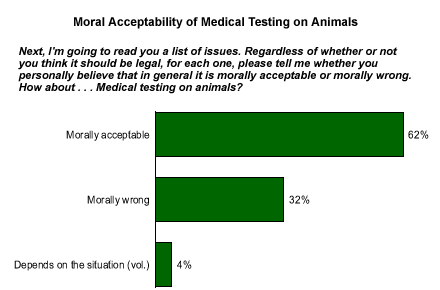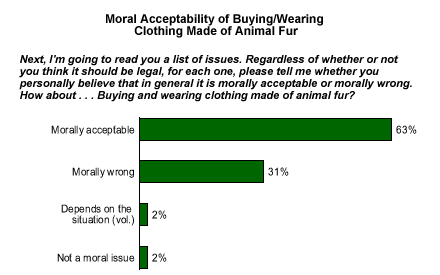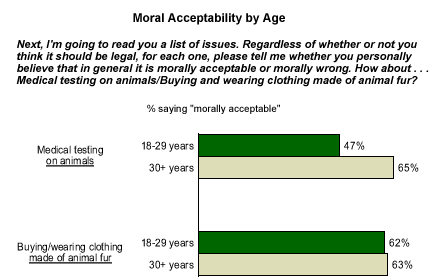It's not that Americans don't like animals. They flock to zoos and own pets of all shapes and sizes. They've devoted an entire cable channel -- Animal Planet -- to them, and animals are the main characters in blockbuster movies such as Finding Nemo and Shrek.
Despite all that, animal rights issues don't currently strike a chord in the hearts and minds of most Americans. To the dismay of animal rights activism groups such as People for the Ethical Treatment of Animals (PETA), Gallup's recent Values and Beliefs poll* shows that solid majorities of Americans feel that both "medical testing on animals" and "buying and wearing clothing made of animal fur" are morally acceptable.
Medical Testing on Animals
Just under two-thirds of Americans (62%) believe that medical testing on animals is morally acceptable, while 32% feel it is morally wrong. This finding is not completely surprising -- medical testing can include researching cures for deadly diseases such as AIDS and cancer, and many people may believe that animals' lives are worth the sacrifice.

Lisa Calloway, a 35-year-old graphic designer and pet owner from Maryland, shares the majority's opinion on this issue. She believes that medical testing on animals is necessary and should be "morally acceptable within limits." "I believe we should use animals that are overpopulated," she says. "There also should be guidelines set so that we do not abuse the right."
But not everyone feels that animal testing is necessary to medical research. Connie, who asked that her last name not be used, is a 52-year-old Maryland multimedia developer, pet owner, and lifelong vegetarian. "I think that we are far enough along in computer science to simulate animal research using scientific programming/visualization. Perhaps we are not there yet, but if society valued the lives of animals, we would put funds toward developing this capability," she says.
Wearing Animal Fur
New York City's "Olympus Fashion Week," which took place from Feb. 6-13, was a time for designers from all over the world to come together and reveal their new fall designs. Fur appeared in nearly every collection -- a "must have" in the words of designer Carolina Herrera.
The public opinion climate seems favorable for ample use of fur in fashion at this point. Americans are equally likely to believe wearing animal fur is morally acceptable as they are to believe that medical testing on animals is morally acceptable. Sixty-three percent feel that buying and wearing clothes made of animal fur is acceptable, while 31% think it is wrong.

Calloway echoes the views of many Americans in her opinion about whether wearing fur is acceptable: "Yes, why not? We use many different types of materials for clothing." However, she draws the line when it comes to using the fur of at-risk animal species. Connie sees things differently: "Humans have certainly developed adequate synthetic and natural materials to keep ourselves warm without killing animals."
Demographic Differences
Further analysis of the data reveals some interesting differences on these questions among demographic groups. Men are significantly more likely than women to view both medical testing on animals and wearing animal fur as morally acceptable. College graduates and those with postgraduate educations are also more likely than those with a high school education or less to find these practices acceptable.
The results also vary by age group. The youngest adults (those aged 18 to 29) are significantly less likely than adults in other age groups to believe that medical testing on animals is morally acceptable (47% of 18- to 29-year-olds vs. 65% of those 30 and older). However, when it comes to buying and wearing clothing made of animal fur 18- to 29-year-olds hold similar views to other age groups.

*Results are based on telephone interviews with 1,000 national adults, aged 18 and older, conducted May 2-4, 2004. For results based on the total sample of national adults, one can say with 95% confidence that the margin of sampling error is ±3 percentage points.
